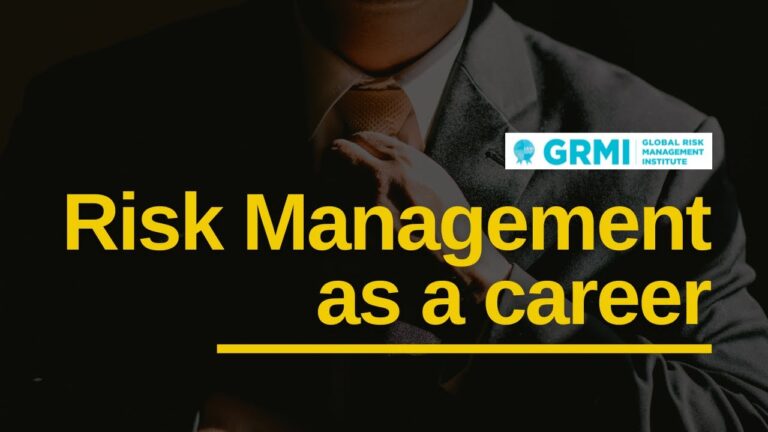
What is PGDRM? Your Complete Guide to the Postgraduate Diploma in Risk Management at GRMI
What is PGDRM? Your Complete Guide to the Postgraduate Diploma in Risk Management at GRMI
In today’s fast-paced and unpredictable business environment, risk is no longer a peripheral concern. It sits at the heart of strategic decision-making. Organisations of all sizes seek professionals who can anticipate, quantify, and mitigate risks before they escalate.
This growing demand has expanded the field of risk management course. Among them, the Postgraduate Diploma in Risk Management (PGDRM) offered by the Global Risk Management Institute (GRMI) has gained attention for its quality and industry relevance.
This one-year, industry-integrated course equips early-career professionals with the skills, tools, and frameworks to address risks in a structured, proactive way. From financial risks and cyber threats to operational and regulatory challenges, GRMI’s PGDRM covers it all. Let’s explore this programme in detail and understand why it is considered a top pathway for a career in risk management.
What is PGDRM?
The Postgraduate Diploma in Risk Management (PGDRM) is a specialised course focusing on identifying, analysing, and mitigating risks in modern organisations.
It is a full-time, one-year programme that blends academic theory with practical, industry-relevant learning. The structure typically includes:
- 10 months of rigorous classroom training
- 6–8 week guaranteed internship with top organisations
GRMI’s PGDRM is globally benchmarked, endorsed by OTHM (UK), and aligned with EQF Level 7, academically equivalent to a master’s degree. This provides graduates with recognition both in India and internationally.
Why Choose GRMI PGDRM?
Many risk management courses exist, but GRMI’s PGDRM stands out due to:
Industry-Integrated Curriculum
The syllabus covers 18+ subjects across:
- Enterprise Risk Management
- Financial Risk Management
- Cyber and IT Risk
- ESG Compliance
- Governance and Applied Analytics
Top-Notch Faculty
GRMI’s faculty includes experienced industry leaders, senior professionals from Big 4 consulting firms, regulatory veterans, and reputed professors. Students learn from experts who have navigated real business crises.
Placement Success
KPMG, PepsiCo, Tata Communications, and others.
- Fresher CPC: ~₹9.25 LPA
- Experienced professionals: Salary hikes up to 250%
Global and Domestic Recognition
The OTHM (UK) endorsement ensures graduates can pursue opportunities both in India and internationally.
Who Should Enroll?
GRMI’s PGDRM is ideal for:
- Fresh graduates from commerce, management, engineering, statistics, or economics seeking specialisation in risk management
- Early-career professionals (0–4 years experience) aiming to accelerate their careers
- Professionals changing careers and seeking entry into a high-demand field without committing to a full two-year MBA
Risk management roles span industries, including banking, consulting, manufacturing, and technology. PGDRM provides a headstart across all these sectors.
Curriculum in Detail
Foundation & Bridge Module
This phase aligns students from any background to core business concepts:
- Financial Accounting
- Managerial Economics
- Corporate Governance
- Business Ethics and CSR
- Financial Management Basics
Core Risk Concepts
Students study:
- Value Chains and Process Mapping
- Assurance and Internal Controls
- Introduction to Financial Risk Management: Credit, Market, Operational Risk
- Strategic Thinking and Planning
- Third-Party Risk Management
- Organisational Behaviour and HR Risk
Advanced Risk Domains
Focus areas include:
- Enterprise Risk Management Frameworks (COSO ERM)
- Regulatory Compliance: AML, FCPA, GDPR
- Cybersecurity and IT Risk
- ESG and Sustainability Risk
- Sectoral Risk Scanning
- Applied Data Analytics: SQL, Power BI Visualisation
- Digital Transformation Risk
Internship
Students complete a guaranteed internship with GRMI’s industry partners, applying classroom learning to real organisational challenges.
Career Prospects After PGDRM
Graduates can pursue roles such as:
- Risk Analyst
- Internal Auditor
- Compliance Officer
- Cyber Risk Consultant
- Enterprise Risk Specialist
- Business Continuity Planner
- ESG & Sustainability Risk Advisor
With businesses becoming more risk-aware, these roles are central to organisational survival and growth.
The Growing Importance of Risk Management
Demand for risk professionals has never been higher. The global risk advisory market exceeds USD 40 billion and grows over 20% annually.
Larger organisations spend USD 30–50 million annually on risk-related activities. Regulatory changes and technological disruptions are driving companies to integrate risk thinking into daily operations.
How GRMI Compares to Other Institutes
GRMI’s PGDRM distinguishes itself through:
- Depth of content: Covers financial, operational, strategic, and technology risk
- Full-time immersion: 6 days a week of structured learning
- Guaranteed internship: Integrated into the programme
- Global recognition: OTHM (UK) accreditation
- Industry partnerships: Curriculum stays relevant, and placements remain strong
Conclusion: Secure Your Future with GRMI PGDRM
The PGDRM at GRMI is more than a qualification. It is a launchpad for a high-growth career.
As industries face unprecedented challenges, the ability to manage risk effectively is one of the most valuable skills in business.
GRMI’s programme blends academic rigour with real-world application, offers global recognition, and delivers exceptional placement outcomes.
For graduates and early-career professionals ready to specialise in a domain that is both intellectually rewarding and professionally strategic, GRMI’s PGDRM provides a future-ready pathway to becoming a leader in risk intelligence.
FAQ's
Q1: How long does the GRMI PGDRM program last?
Ans: The one-year, full-time Postgraduate Diploma in Risk Management (PGDRM) program combines classroom instruction with a guaranteed internship.
Q2: Who at GRMI is qualified for PGDRM?
Ans: Enrolment is open to recent graduates in any field as well as professionals in their early careers with 0–4 years of experience who want to specialise in risk management.
Q3: After PGDRM, what professional options are there?
Ans: In sectors like banking and financial consulting, manufacturing, & technology, graduates can work as risk analysts, compliance officers, internal auditors, cyber risk consultants, and enterprise risk specialists.
Q4: Does the PGDRM program offer acknowledgement on a global scale?
Ans: Yes, OTHM (UK) has approved GRMI’s PGDRM, which is in line with EQF Level 7 and grants graduates recognition in India and abroad.
Q5: What distinguishes PGDRM from other risk management courses offered by GRMI?
Ans: With its industry-integrated curriculum, excellent faculty, internship guarantee, and robust placement assistance, the program makes sure graduates are prepared for difficulties in the real world.
You may also like

Silver Price Today 25 Feb 2026 – Risk Insights & Market Trends

India Faces 15% US Tariffs After Supreme Court Ruling



